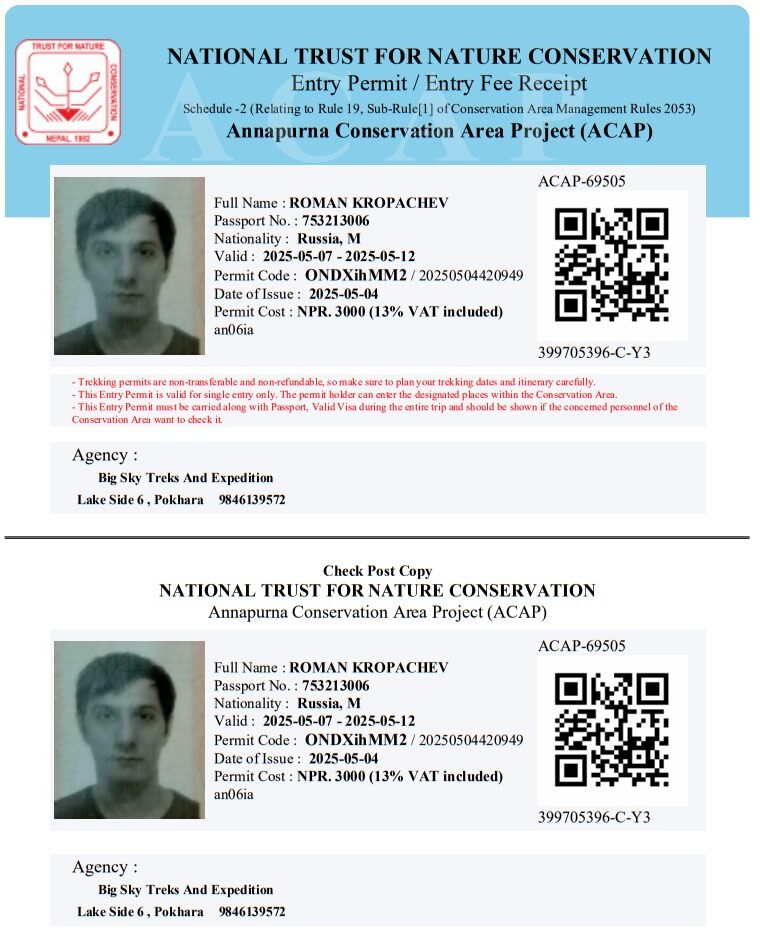Table of Contents
Mardi Himal Trek: It is a short and scenic journey in the Annapurna region that offers stunning views of Machhapuchhre, Annapurna South, and Mardi Himal. It’s a less-crowded trail that takes you through lush forests, traditional villages, and alpine landscapes to the Mardi Himal Base Camp.
Mardi Himal Trek
The Mardi Himal Trek is a hidden gem in Nepal’s Annapurna region, offering stunning views of peaks like Annapurna South, Machhapuchhre (Fishtail), and Mardi Himal itself. This moderate trek, reaching up to 4,500 meters, is ideal for both beginners and seasoned trekkers seeking a less crowded trail with rich cultural and natural experiences. However, to embark on this adventure, obtaining the necessary permits required for Mardi Himal Trek is essential. This guide details the permits needed, how to obtain them, and why they are crucial for a safe and legal trekking experience.
Why Permits Are Required for Mardi Himal Trek

Permits are mandatory for trekking in Nepal’s Annapurna region, including the Mardi Himal Trek, to ensure trekkers’ safety, regulate tourism, and support conservation efforts. These permits help authorities maintain trails, protect the environment, and track trekkers in remote areas. Without the proper trekking permits, you risk fines, being turned back at checkpoints, or missing out on the full experience. The permits required for Mardi Himal Trek are straightforward but must be secured before starting your journey.
Permits Required for Mardi Himal Trek
For the Mardi Himal Trek, you need one primary permit, though regulations have evolved in recent years. Below is the key permit required:
Annapurna Conservation Area Permit (ACAP)
The Annapurna Conservation Area Permit (ACAP) is mandatory for entering the Annapurna Conservation Area, where the Mardi Himal Trek is located. This permit supports conservation efforts, trail maintenance, and community development in the region.
- Cost:
- Foreign nationals: NPR 3,000 (approximately USD 25)
- SAARC nationals: NPR 1,000 (approximately USD 8)
- Nepalese nationals: NPR 100
- Purpose: Grants access to the Annapurna Conservation Area and supports environmental preservation.
- Checkpoints: The permit is checked at entry points like Pothana or Dhampus, depending on your starting route.
Note on TIMS Card
The Trekkers’ Information Management System (TIMS) card was previously required for the Mardi Himal Trek to log trekker details for safety. However, as of recent updates (post-2023), the TIMS card is no longer necessary for this trek, as local permits have largely replaced it in the Annapurna region. Some sources may still mention TIMS, but the Pokhara office of the Nepal Tourism Board has stopped issuing it for this trek since 2021. Always confirm with the Nepal Tourism Board for the latest regulations.
How to Obtain Permits Required for Mardi Himal Trek
Securing the permits required for Mardi Himal Trek is a straightforward process, whether you’re trekking independently or with a trekking agency. Here’s how to get the ACAP permit:
Option 1: Obtain Permits Through a Trekking Agency
Most trekkers book their Mardi Himal Trek through a registered trekking agency, which simplifies the permit process. Agencies like Mardi Treks or Big Sky Treks handle all permit logistics as part of their packages. They typically require:
- A copy of your passport
- One passport-sized photo
- Payment in Nepali Rupees (NPR)
The agency will process the ACAP permit for you, ensuring compliance with regulations. This is the easiest option, especially for first-time trekkers, as it eliminates paperwork hassles.
Option 2: Obtain Permits Independently
If you’re trekking independently, you can obtain the ACAP permit directly from the Nepal Tourism Board (NTB) or Annapurna Conservation Area Project (ACAP) offices. Here’s the step-by-step process:
- Visit the Nepal Tourism Board or ACAP Office:
- Kathmandu: Nepal Tourism Board, Bhrikuti Mandap, 2 km from Thamel (30-minute walk). Open Monday–Friday and Sunday, 10 AM–5 PM (closed Saturdays).
- Pokhara: ACAP office or Tourism Information Center, preferred for its proximity to the trek’s starting point.
- Required Documents:
- A valid passport
- Two passport-sized photos (photos can be taken at the office for free if you don’t have them)
- Contact details of a person in Nepal (e.g., your hotel)
- Travel insurance details (recommended)
- Fill Out the Application:
- Complete the ACAP application form available at the counter.
- Submit the form with your documents and payment (NPR 3,000 for foreigners, NPR 1,000 for SAARC nationals).
- Pay in Nepali Rupees:
- Only Nepali currency is accepted, so exchange money in Kathmandu or Pokhara beforehand. Carry small denominations for convenience.
- Collect Your Permit:
- Permits are typically issued within 20–30 minutes. Keep the permit with you throughout the trek, as it will be checked at checkpoints like Pothana or Dhampus.
Tip: It’s recommended to obtain permits in Kathmandu for efficiency, as Pokhara’s offices may have longer queues during peak seasons (March–April, October–November).
Important Notes
- Guides Are Mandatory: As of recent regulations, solo trekking without a licensed guide is not allowed for safety reasons. A guide enhances your experience with local knowledge and ensures compliance with permit checks.
- Travel Insurance: While not a permit, travel insurance is highly recommended for the Mardi Himal Trek. It should cover high-altitude trekking (up to 4,500 meters), medical emergencies, trip cancellations, and helicopter rescues. World Nomads is a popular choice for trekkers.
- Keep Permits Safe: Carry your ACAP permit at all times, as checkpoints are frequent, and losing it may result in fines or complications.
- Local Fees: In 2023, Mardi Himal’s rural municipality proposed a NPR 500 local fee, but it was not implemented due to local opposition. Check for updates before your trek.
Why Mardi Himal Trek Is Worth It
The Mardi Himal Trek offers a unique blend of solitude, stunning mountain views, and cultural immersion. With the right permits required for Mardi Himal Trek, you can explore this off-the-beaten-path trail with peace of mind. Here’s how the trek enhances your experience:
- Breathtaking Views: Enjoy panoramic vistas of Annapurna, Machhapuchhre, and Dhaulagiri from High Camp and Mardi Himal Base Camp.
- Cultural Immersion: Interact with local Gurung and Magar communities, experiencing their traditions and hospitality in teahouses.
- Eco-Friendly Trekking: The ACAP permit supports conservation efforts, ensuring the trail and environment remain pristine.
- Beginner-Friendly: With a moderate difficulty level and well-established teahouses, it’s accessible for first-time trekkers.
- Guides Enhance Safety: A licensed guide provides insights into the region’s culture, flora, and fauna while ensuring your safety at high altitudes.
By securing the permits required for Mardi Himal Trek and trekking with a guide, you’ll have a safe, memorable, and environmentally responsible adventure.
Faq’s
What permits are required for the Mardi Himal Trek?
You need the Annapurna Conservation Area Permit (ACAP), costing NPR 3,000 for foreigners and NPR 1,000 for SAARC nationals. The TIMS card is no longer required for this trek.
Where can I get the ACAP permit for Mardi Himal Trek?
You can obtain the ACAP permit from the Nepal Tourism Board in Kathmandu or the ACAP office in Pokhara. Trekking agencies can also arrange it for you.
Do I need a guide for the Mardi Himal Trek?
Yes, recent regulations mandate a licensed guide for safety. Solo trekking without a guide is not recommended and may be illegal.
How much do permits for Mardi Himal Trek cost?
The ACAP permit costs NPR 3,000 (approx. USD 25) for foreigners, NPR 1,000 for SAARC nationals.
Is travel insurance necessary for the Mardi Himal Trek?
While not a permit, travel insurance is highly recommended to cover medical emergencies, trip cancellations, and high-altitude risks up to 4,500 meters.
How Mardi Himal Trek Helps You?
Mardi Treks, a government-recognized travel agency, simplifies the process of obtaining the permits required for Mardi Himal Trek, specifically the Annapurna Conservation Area Permit (ACAP). Here’s how they assist:
- Hassle-Free Permit Processing: Mardi Treks handles all paperwork for the ACAP permit (NPR 3,000 for foreigners, NPR 1,000 for SAARC nationals), requiring only your passport copy and a passport-sized photo, saving you time and effort.
- Expert Coordination: Their team liaises with the Nepal Tourism Board or ACAP offices in Kathmandu or Pokhara to secure permits quickly, even during peak seasons (March–April, October–November).
- Payment Convenience: Mardi Treks includes permit fees in their package costs, accepting payments in Nepali Rupees, so you don’t need to exchange currency or visit permit offices.
- Compliance Assurance: They ensure compliance with regulations, such as the mandatory licensed guide rule, and provide guides who manage permit checks at checkpoints like Pothana or Dhampus.
- Pre-Trek Guidance: Mardi Treks offers briefings on permit requirements and provides resources to prepare you, ensuring you carry the ACAP permit and meet all legal trekking standards.
With Mardi Treks’ expertise, securing the permits required for Mardi Himal Trek is seamless, letting you focus on enjoying the stunning Annapurna region.
Conclusion
The permits required for Mardi Himal Trek, primarily the Annapurna Conservation Area Permit (ACAP), are essential for a legal and safe trekking experience. By obtaining the permit through the Nepal Tourism Board or a trekking agency, carrying Nepali Rupees, and trekking with a licensed guide, you’ll ensure a smooth journey. The Mardi Himal Trek rewards you with breathtaking landscapes, cultural richness, and a sense of adventure, all while supporting conservation efforts. Prepare your documents, secure your trekking permits, and embark on an unforgettable journey in Nepal’s Annapurna region.
Contact Us
Contact US
Location: Mardi Treks, Nepal
Email: info@marditreks.com
Phone: +977 9864379436
